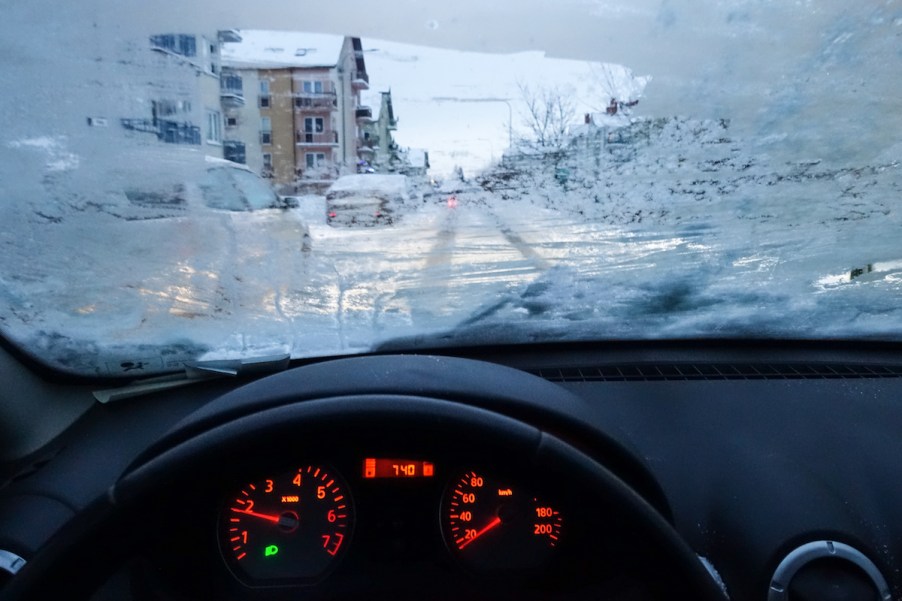
What Should You Never Do to Your Car in the Winter?
Winter can be a joyful time of year. It can also be a nightmare for your car. All of that beautiful white fluff falling from the sky can do plenty of damage, and road salt can leave your car a mess.
You can protect your vehicle by following car safety and maintenance tips. But what about the things you shouldn’t do? Could you actually do more harm than good to your vehicle?
Don’t use hot water to thaw a frozen windshield

It sounds like a solid plan, especially if you’re already running late. Just microwave some water and toss it on the windshield. The ice should just melt away, and then you can be on your way.
But according to Car Care Hunt, there are two problems with this method. The first is that you can be badly hurt if you pour hot water on yourself. The second reason is that hot water, ice, and windshields don’t mix. Pouring hot water on a frozen windshield could crack it.
Rather than going this route, use the car’s defroster. An ice scraper would also do the trick.
Don’t turn your wipers on if they have ice on them
Using windshield wipers in the rain works great. However, if they’re iced over, you could do considerable damage to your wipers and the windshield. From shredding the rubber that makes your wipers work efficiently to scratching the windscreen, you could do plenty wrong.
Then there’s the chance of damaging the windshield wiper motor, which can be a pain to replace. Rather than going through all this, stand the windshield wipers upright if you think there will be ice. Placing a sock over them while raised upright will also help protect the wipers.
Don’t neglect tire pressure on your car in the winter
Tire pressure is one of those car maintenance tasks that drivers often overlook until it’s too late. It’s always important to monitor it, but in the winter, when tire pressure can drop for every 10-degree decrease in temperature, your wheels can quickly lose air.
Regularly checking the air pressure can help keep you and passengers in your car safe. To do this, wait until both the tires and the temperature are cold. It might be a pain to get out in chilly temps, kneel on the ground, and try to work off those tiny knobs, but you’ll get a more accurate reading.
Don’t ignore your car’s battery in the winter
Car batteries sometimes need a little tender loving care. That’s because extreme temperatures can do plenty of damage to them.
For anyone who lives in mild climates, it’s not that big of a deal during the winter. But if you live in an area where the temps drop below zero, you need to take a few steps to ensure your battery is in tip-top shape.
Pulling your battery out sounds like an ordeal, especially when you have to take it inside and wrap it in a blanket, but it can help save your battery. Just make sure there aren’t any cracks or corrosion on it first.
Don’t forget about the cooling system
Antifreeze is easy to maintain, so it can be easy to forget. By neglecting it, you could have an engine that overheats.
To prevent this, check your cooling system to ensure you aren’t running low on antifreeze. Also, make sure it doesn’t look dirty or isn’t full of debris. If it is, a coolant flush and fluid replacement should have your system back in working order.
Don’t leave your car with an empty or nearly empty gas tank
It’s easy to put off filling your fuel tank, especially when you’re waiting for payday. But that’s a bad idea in the winter. There’s moist air in your tank, and when the temperature drops below freezing, that water can crystallize and freeze.
Don’t warm up your car for too long
Warming up your car in the winter is fine, but don’t overdo it. Idling longer than a couple of minutes could do damage to your engine, especially if you do it regularly.
DIY hacks to keep your car winter-ready
Now that you know what not to do, here are a few things you should do.
If you don’t have a garage, a car cover can keep the elements from destroying your car’s paint job. An added benefit is that it can also slow down a car thief.
And though winter tires might be expensive, they make traveling on slippery roads less harrowing and much safer.
Finally, spraying your car’s door frames and rubber with cooking spray can help prevent them from freezing shut in the winter. Wipe away any excess spray with a rag or paper towel, and you’ll be ready to jump in and go.


